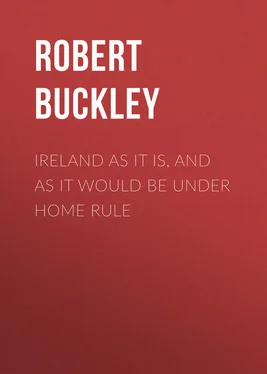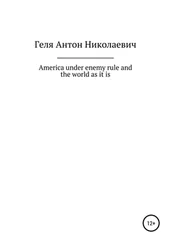Robert Buckley - Ireland as It Is, and as It Would Be Under Home Rule
Здесь есть возможность читать онлайн «Robert Buckley - Ireland as It Is, and as It Would Be Under Home Rule» — ознакомительный отрывок электронной книги совершенно бесплатно, а после прочтения отрывка купить полную версию. В некоторых случаях можно слушать аудио, скачать через торрент в формате fb2 и присутствует краткое содержание. ISBN: , Жанр: foreign_antique, foreign_prose, на английском языке. Описание произведения, (предисловие) а так же отзывы посетителей доступны на портале библиотеки ЛибКат.
- Название:Ireland as It Is, and as It Would Be Under Home Rule
- Автор:
- Жанр:
- Год:неизвестен
- ISBN:http://www.gutenberg.org/ebooks/29710
- Рейтинг книги:5 / 5. Голосов: 1
-
Избранное:Добавить в избранное
- Отзывы:
-
Ваша оценка:
- 100
- 1
- 2
- 3
- 4
- 5
Ireland as It Is, and as It Would Be Under Home Rule: краткое содержание, описание и аннотация
Предлагаем к чтению аннотацию, описание, краткое содержание или предисловие (зависит от того, что написал сам автор книги «Ireland as It Is, and as It Would Be Under Home Rule»). Если вы не нашли необходимую информацию о книге — напишите в комментариях, мы постараемся отыскать её.
Ireland as It Is, and as It Would Be Under Home Rule — читать онлайн ознакомительный отрывок
Ниже представлен текст книги, разбитый по страницам. Система сохранения места последней прочитанной страницы, позволяет с удобством читать онлайн бесплатно книгу «Ireland as It Is, and as It Would Be Under Home Rule», без необходимости каждый раз заново искать на чём Вы остановились. Поставьте закладку, и сможете в любой момент перейти на страницу, на которой закончили чтение.
Интервал:
Закладка:
"There is a complete cessation of railway work. Already the men are thinking of moving. But this is not all. I am now at a standstill, pulled up short by the bill. What is the effect on England? Under ordinary circumstances I buy largely all kinds of railway material – steel rails, sleepers, fasteners, engines, and carriages. Every year I send thousands and thousands of pounds to England for these things, and surely most of the money goes indirectly into the pockets of English working men, who are now suffering the loss of all this by reason of their apathy in this matter. I speak only as a man of business, anxious for the prosperity of my country. I do not discuss Home Rule; never did discuss it and never will. But I end where I began, and I repeat the bill will ruin Ireland, will be bad for England, and I will add that the British Government will soon be compelled to intervene to stave off Irish bankruptcy. Home Rulers are now becoming afraid of the bill; artisans, farmers, and labourers think it a good joke. They relished the hunt, but they don't want the game.
"Returning to my own affairs, I say without hesitation that though the mere threat of the bill has paralysed my business, and that the passing of the bill would drive my men to England, yet – throw out the bill, deliver us from the impending dread, and during the next two years I shall myself expend £150,000 in railway material manufactured by British artisans. Emphatically I repeat that Home Rule to the British working man means increased competition and direct pecuniary loss."
Mr. S. McGregor, of 30, Anglesea Street, Dublin, has been located in the city for 34 years, and seems to have been a politician from the first. Coming from the Land o' Cakes, he landed an advanced Radical, and a devoted admirer of the Grand Auld Mon. Once on the spot a change came o'er the spirit of his dream. His shop has the very unusual feature of indicating his political views. Her Gracious Majesty, Lord Beaconsfield, and Mr. Balfour look down upon you from neat frames. I am disposed to regard Mr. McGregor as the pluckiest man in Ireland. A quiet, peaceful citizen he is, one who remembers the Sawbath, and on weekdays concentrates his faculties on his occupation as a tailor and clothier. I did not seek the interview, which arose from a business call not altogether unconnected with a missing button, but his opinions and his information are well worth recording. Mr. McGregor said, "I thrust my opinions on none, but I have a right to my opinions, and I do not affect concealment. The great defect of the Irish Unionists is want of courage. They dare not for their lives come forward and boldly state their convictions. If Lord Emly or some other Irish Roman Catholic nobleman had come forward earlier, it might have induced weak-kneed members of the party to do likewise. The Unionists do not exercise the great influence they undoubtedly possess. They allow themselves to be terrorised into silence. Let them have the courage of their opinions and they have nothing to fear. The masses of the industrial population are not in favour of Home Rule. The corner-men, who want to spend what they never earned, and the farmers, who hope to get the land for nothing, are the only hearty Home Rulers in Ireland. I employ ten people, all Roman Catholics, some of them with me for twenty-five years. None of these are Home Rulers. I became a convert to Conservatism by my intimate knowledge and personal acquaintance with many of the leaders of the Fenian movement. I saw through the hollowness of the whole thing, and declined any connection therewith. Poor Henry Rowles, who was to be told off by signal to shoot Mr. Foster, was one of my workmen. He died in prison, some said from sheer fright, but two or three of his friends were hanged. He was mixed up by marriage with the Fenian party, and was drawn on and on like many another. I would rather not name the Fenian leaders I knew, and the reason is this. I knew them too well. Speaking of the Unionist lack of courage, you must not be too much surprised. During the last fourteen years Unionists have had to maintain a guerilla warfare for existence. But the strangest feature of the present position is this – the Home Rulers are kicking at the bill! A great Home Ruler of my acquaintance (Mr. McGregor referred me to him) is getting quite afraid. He is a farmer holding 300 acres under Lord Besborough, and says that he trusts things will remain as they are. He has a good landlord, borrows money by the subvention, and has a perfect horror of the class of men who will obtain the upper hand in Ireland. A Nationalist over the way was about to extend the buildings you see there. Plans were drafted, and offices were to be built. Out comes the bill and in goes the project. He has no confidence in the Irish Nationalist leaders; but, strange to say he believes in Mr. Gladstone. He admits that the Irish M.P.'s are not quite up to his ideal, but believes that the Grand Old Man's genius for accommodation and ingenious dovetailing of Imperial interests will pull the country through. Meanwhile he lays out no penny of money.
"I am a Presbyterian, and what is more a United Presbyterian, belonging to the Presbyter of Scotland. All Scotch Presbyterians are advanced Radicals. We have four hundred members here. They came here worshippers of Gladstone and Home Rulers to the tune of 97 per cent. The congregation is now 99 per cent. Unionist or Conservative out and out. Of the four hundred we have only three Home Rulers. What will the English people say to that? Tell them that our minister, who came here a Home Ruler, is now on a Unionist mission in Scotland – the Rev. Mr. Procter, brother of Procter, the cartoonist of Moonshine and the Sketch , to wit. My workpeople, all steady, industrious people, ask but one thing – it is to be let alone."
Here Mr. G.M. Roche, the great Irish wool-factor and famous amateur photographer, said —
"Ah! we must have the bill. 'Tis all we want to finish us up. We're never happy unless we're miserable; the bill will make us so and we'll never be properly discontented till we get it!"
Passing through the Counties of Louth, Dublin, Londonderry, Monaghan, Tyrone, Donegal, and Fermanagh, I met with many farmers whose statements amply confirmed the words of the descendant of the great Sir Boyle Roche. These unhappy men had been divested of their last grievance, stripped of their burning wrongs, heartlessly robbed of their long-cherished injuries. It was bad enough before, when Irishmen had nothing except grievances, but at least they had these, handed down from father to son, from generation to generation, along with the family physiognomy, two precious, priceless heirlooms, remarkable as being the only hereditary possessions upon which the brutal Saxon failed to cast his blood-shot, covetous eye. And now the grievances are taken away, the Lares and Penates of the farmer's cabin are ruthlessly removed, and the melancholy peasant looks around for the immaterial antiquities bequeathed by his long-lost forefathers. "Ah; don't the days seem lank and long, When all goes right and nothing goes wrong, And isn't our life extremely flat, When we've nothing whatever to grumble at." The Irish farmer is with the poet, who hits his harrowing anguish to a hair. He folds his hands and looks about, uncertain what to do next. His rent has been lowered by 35 per cent., he has compensation for improvements, fixity of tenure, and may borrow money to buy the land outright at a percentage, which will amount to less than his immortal Rint. What is the unhappy man to do? His grievances have been his sole theme from boyhood's happy days, the basis of his conversation, his actuating motive, the very backbone of his personal entity. Now they are gone, the fine gold has become dim, and the weapons of war have perished. Once he could walk abroad with the proud consciousness that he was a wronged man, a martyr, a brave patriot struggling nobly against the adverse fates, a broth of a boy, whose melancholy position was noted by the gods, and whose manly bearing under proffered slavery established a complete claim to high consideration in Olympus. But now, with heart bowed down with grief and woe, he walks heavily, and even as a man who mourneth for his mother, over the enfranchised unfamiliar turf. He peeps into the bog-hole, and does not recognise himself. He could pay the rent twice over, but he hates conventionalities, and would rather keep the money. He is constructed to run on grievances, and in no other grooves, and the strangeness of his present position is embarrassing. The tenants of Lord Leitrim, Lord Lifford, and the Duke of Abercorn make no complaint of their landlords. On the contrary, they distinctly state that all are individually kind and reasonable men, and while attributing their own improved position to the various Land Acts given to Ireland, which leave the actual possessor of the land small option in the matter, they freely admit that these gentlemen willingly do more than is ordained by any act of Parliament, and that over and above the provisions of the law, all three are fair-minded men, desirous of doing the right thing by their people and the country at large. Other landlords there were on whose devoted heads were breathed curses both loud and deep.
Читать дальшеИнтервал:
Закладка:
Похожие книги на «Ireland as It Is, and as It Would Be Under Home Rule»
Представляем Вашему вниманию похожие книги на «Ireland as It Is, and as It Would Be Under Home Rule» списком для выбора. Мы отобрали схожую по названию и смыслу литературу в надежде предоставить читателям больше вариантов отыскать новые, интересные, ещё непрочитанные произведения.
Обсуждение, отзывы о книге «Ireland as It Is, and as It Would Be Under Home Rule» и просто собственные мнения читателей. Оставьте ваши комментарии, напишите, что Вы думаете о произведении, его смысле или главных героях. Укажите что конкретно понравилось, а что нет, и почему Вы так считаете.












